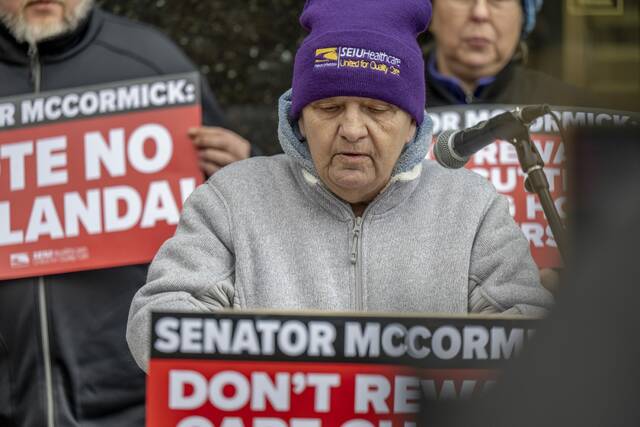Alyson Holt’s house in Murrysville is starting to fill up with 3D printers.
Her husband, Gary, already had two and recently ordered a third. These days, they are humming steadily, creating moldable face masks using polyactic acid plastic, the most common material for 3D printing.
The Holts are using a design created by a trio of Montana doctors. The masks can be fitted to a user’s face, can use any available filter, are able to be cleaned and reused, and are created from design files available for free at MakeTheMasks.com.
“We have a relative who’s a nurse in Wyoming, and she said they were making a bunch of these for nurses and doctors,” Gary Holt said.
The Holts have made about 70 masks so far. And with Gov. Tom Wolf’s latest order requiring employees and residents to wear masks when they venture out of their homes and visit stores or workplaces, their household operation is likely to get even more popular.
For much of the state, however, a 3D printed mask is not a readily-available option. So residents have been asked to use bandanas, scarves or whatever material is available in an effort to prevent further transmission of the coronavirus.
Dr. Amesh Adalja, a Pittsburgh-based infectious disease physician, said the medical community is far from united when it comes to opinions about blanket usage of masks.
“The CDC decided that because of the risks, especially of asymptomatic transmission — where people who don’t have symptoms are passing along the virus — people should wear face coverings.
“So it’s not that the mask is protecting you as the wearer, but it’s protecting other people from you.”
Adalja said the medical community’s understanding of asymptomatic transmission is not thorough enough to guarantee that widespread prophylactic mask use will be beneficial.
Even for those not wearing a mask, Adalja said, “the virus still needs a mechanism to get to another person, and social distancing should take care of that.”
A CDC advisory issued this week asks people to wear, at the very least, a cloth face covering when leaving the house. The agency provides on its website instructions to create sewn masks, masks cut from T-shirts, and bandana masks using rubber bands.
Adalja said he’s happy that those measures will reduce the demand for medical-grade masks for those on the front lines of the covid-19 pandemic.
In Hampton, business owner Rose Morris has taken the medical-grade fabric her company Abram’s Nation typically uses to create safety beds and begun using it to create machine-washable fabric masks.
“It’s a heavy-duty polyester,” Morris said. “It’s not a respirator or N95-grade. But it’s a wicking fabric, and it’s antimicrobial as well as breathable.”
Her goal was to help those in the everyday medical community, who are not on the front lines but are unable to get the type of protective equipment they may need.
“If we can help people at that level so that the front-line folks who are dealing with covid-19 cases can have access to N95, that’s our hope,” Morris said.
Adalja said the avalanche of available information about prevention and protection, and the inconsistency from state to state and at the federal level has made it hard for people to know exactly what they should be doing.
“In my mind, there’s a lot of difficulty trying to square the different types of guidance we’re seeing, and it’s something that’s controversial within the field as well,” he said.
That hasn’t stopped the Holts from creating a set of masks for members of Murrysville’s public works department. Alyson Holt said finding filters is the most complicated part.
“I bought some quilter’s squares, which are thin,” she said. “So you can combine those with other layers. We’ve been using these 3-by-3-inch cotton gun-cleaning cloths. I tell people to put as many in as they can comfortably breathe through.”
Regardless of what material Pennsylvania residents choose to use, Dr. Adalja was quick to note that masks are just one part of prevention efforts.
“It’s really important to remember that this a supplement to hand-washing and preventive hygiene,” he said. “We don’t want people to start paradoxically touching their faces more because they have a mask on. We don’t want people to come home and just toss the mask on the couch.”













